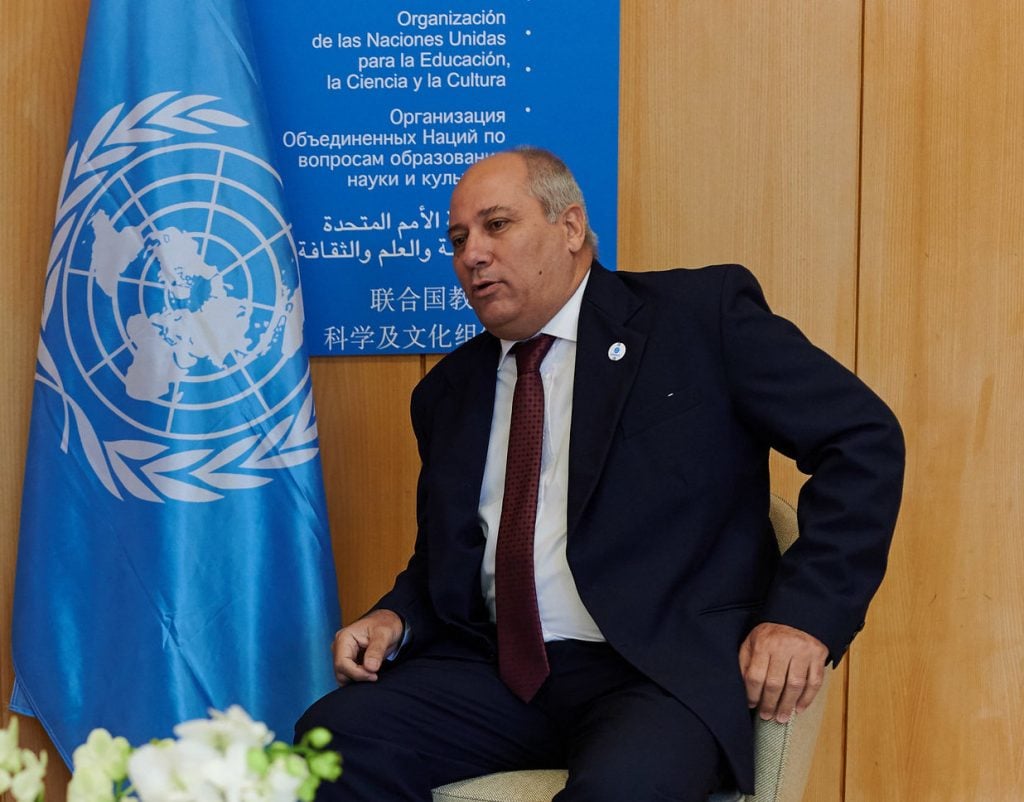Art World
In an Unprecedented Action, Thousands of Cubans Are Publicly Demanding the Resignation of Culture Minister Alpidio Alonso
Alonso was captured on video physically confronting demonstrators on January 27.

Alonso was captured on video physically confronting demonstrators on January 27.

Brian Boucher

In a new indication of shifting tides of power in Cuba, more than 9,000 people have signed a Change.org petition calling for the removal of the country’s minister of culture, Alpidio Alonso.
The Cuban activist group 27N submitted a legal request for Alonso’s removal to the National Assembly of People’s Power on February 3 on behalf of nearly 1,300 artists, intellectuals, and activists. Alonso was captured on video physihcally confronting protestors at the gates of the Ministry of Culture during a peaceful demonstration on January 27 calling for the release of artist Tania Bruguera, who had been detained that morning. Many demonstrators later told media outlets they were beaten by police.
“The Minister must assume responsibility for the violence carried out on January 27 at the gates of the Ministry, otherwise the Cuban government led by [president] Miguel Mario Díaz-Canel Bermúdez and [prime minister] Manuel Marrero Cruz would be accomplices of an act of institutionalized violence and illegality,” the petition says. “This would imply a lack of credibility and legitimacy for his government before the public and international opinion.”
The petition is unprecedented, says Bruguera, who plans to keep the pressure on.
“Every week, we are going to present this demand at the National Assembly, with the new names printed on it,” she told Artnet News in a phone interview.
Notably, many signatories have used their full names to visibly stand up to the government, which last week released a provisional list of which jobs it will allow people to pursue privately, and which ones remain under government control. Running an art gallery and practicing as an architect, for example, remain banned.
Among those publicly challenging those mandates is a Havana art history student, Ray Veiro, who wrote an editorial for the Miami magazine Hypermedia defending independent architectural practice Infraestudio. It ends with a clear call: “Infraestudio cannot be illegal.”
Last week, the government Cuban design collective Atelier Morales took to the press calling on artists and others to stop working with cultural institutions run by the government in what it calls “a strike of personal responsibility.”
Major musicians are also joining the fight, Cuban-American artist Coco Fusco told Artnet News in an email. Among them are exiled Cuban musician Descemer Bueno, a Grammy Award winner, who collaborated with others to release a song titled “Patria y Vida” (“Fatherland and Life”), a reference to Fidel Castro’s call for “Patria o Muerte” (“Fatherland or Death”).
“The lyrics are a call to all Cubans to rise up and scream ya basta [enough is enough] to the government,” she said.
The song, released on YouTube on February 16, has thus far generated more than 550,000 views.
Many who signed the petition are everyday people, Bruguera says, indicating that the artists’ cause has found broader support. “Now, the minister of culture can’t pretend he doesn’t know about the oppression of artists,” she says. “These are slow steps but we are getting there. People are less and less afraid of asking for their rights.”
In November, hundreds of Cubans gathered for 14 hours outside the Culture Ministry, calling for freedom of expression, a development Fusco described to Artnet News as “unprecedented.”
The deputy minister for culture, Fernando Rojas, met with several of them, including Bruguera and writer Katherine Bisquet, and reached an accord. But hopes were dashed when president Díaz-Canel smeared the protestors in state media. Within days, Bruguera and others were under house arrest.
Recent events in Havana have garnered attention in Washington, D.C. On February 8, Robert Menendez, a Democratic U.S. Senator from New Jersey and the son of Cuban immigrants, introduced a resolution expressing solidarity with the dissident San Isidro movement, which includes many artists; condemning attacks on artistic freedom; demanding the repeal of laws that violate freedom of expression; and calling for the release of wrongfully detained artists, journalists, and activists.